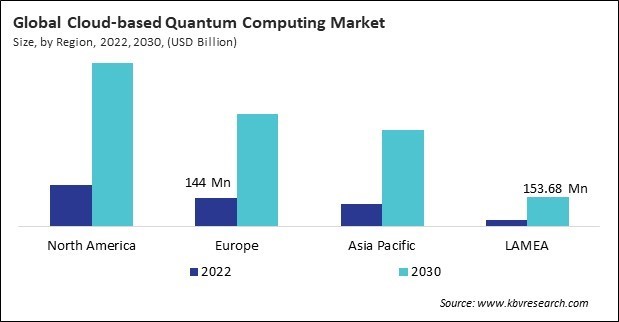According to a new report, published by KBV research, The Global Cloud-based Quantum Computing Market size is expected to reach $2.1 billion by 2030, rising at a market growth of 19.9% CAGR during the forecast period.
The healthcare sector is experiencing unprecedented growth and evolution, driven by advancements in medical technology, genomic research, and a heightened focus on personalized medicine. For example, as per the data from the Organization for Economic Co-operation and Development, in 2020, an unprecedented 10.9% of the GDP of the European Union was devoted to health care. With health expenditures exceeding 12% of their GDP, Germany and France allocated the highest proportions.

Additionally, Belgium, Austria, Sweden, and the Netherlands spent more than 11 percent of their GDP on health. Likewise, according to the Indian Brand Equity Fund, it was anticipated that the Indian healthcare sector would triple in size from $110 billion in 2016 to $372 billion in 2022. The synergy between healthcare and cloud-based quantum computing opens up new possibilities, paving the way for transformative breakthroughs and advancements in the quest for better health outcomes.
The Software segment is leading the Global Cloud-based Quantum Computing Market by Solution in 2022; thereby, achieving a market value of $1.1 billion by 2030. Developers and researchers have made prominent advancements in the development of algorithms that exploit quantum mechanics' distinctive characteristics. These algorithms are adept at solving complex problems in optimization, cryptography, and machine learning, propelling the demand for cloud-based quantum software. Hence, the segment will expand rapidly in the coming years.
The Trapped Ions segment is registering a CAGR of 20.1% during (2023 - 2030). Trapped ions, as qubits, boast exceptional stability and coherence properties, making them an attractive choice for quantum computing implementations. The demand for trapped ions in cloud-based quantum computing is driven by the inherent ability of these qubits to maintain quantum states for extended durations. This stability is crucial for executing complex quantum algorithms with reduced error rates, contributing to the reliability of quantum computations. Hence, these factors will propel the demand in the segment.
The Optimization segment is generating the maximum revenue in the Global Cloud-based Quantum Computing Market by Application in 2022; thereby, achieving a market value of $779 million by 2030. Quantum parallelism and superposition, which refer to quantum computing's capabilities to execute parallel computations and exist in multiple states concurrently, constitute the fundamental basis of its advantage in optimization tasks. The demand for quantum optimization solutions arises from the need to explore numerous possibilities simultaneously, enabling faster and more efficient identification of optimal solutions to complex optimization problems. Hence, these aspects will assist in the growth of the segment.
The Healthcare segment is experiencing a CAGR of 19% during (2023 - 2030). Healthcare organizations are turning to cloud-based quantum computing to analyze large genomic datasets. Quantum algorithms can efficiently process and analyze vast amounts of genetic information, leading to more accurate insights into personalized medicine, disease susceptibility, and treatment responses. Therefore, these factors can lead to increased demand in the segment.
Full Report: https://www.kbvresearch.com/cloud-based-quantum-computing-market/
The North America region dominated the Global Cloud-based Quantum Computing Market by Region in 2022; thereby, achieving a market value of $851.6 million by 2030. The Europe region is poised to grow a CAGR of 19.4% during (2023 - 2030). Additionally, The Asia Pacific region would witness a CAGR of 20.8% during (2023 - 2030).
By Solution
By Technology
By Application
By Vertical
 Unique Offerings
Unique Offerings